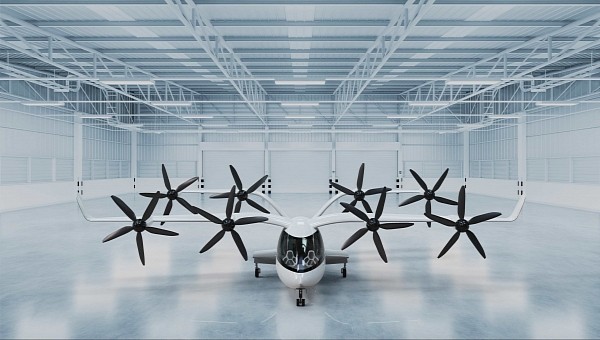U.S. companies are dominating the emerging sector of electric air mobility, with several European and Asian players following close behind. While these have already moved to the next stage, that of infrastructure development, AAM (Advanced Air Mobility) is still in its early stages in other parts of the world. After Australia, Canada is also joining the air taxi club with a fresh design.
Don’t be fooled by its name: LimoConnect isn’t inspired by limousines, also it could be considered the air mobility equivalent of the luxurious vehicle. This eVTOL (electric vertical take-off and landing)’s name actually comes from nature.
The bar-tailed godwit (Limosa lapponica) is an incredible, record-breaking bird. In 2022, a young Limosa smashed world records for the longest nonstop bird flight, with an incredible 11-day journey from Alaska to Tasmania (8,425 miles/13,560 km).
The LimoConnect’s aerodynamic fuselage was modeled after this incredible bird’s body. So far, there aren’t many details available about its future performance. It’s supposed to be an all-electric aircraft with VTOL capabilities, that would be able to operate autonomously and work just as fine for passenger transport and cargo applications.
Its most notable feature is the eight-seat capacity, which is basically double than most air taxis currently gearing up for commercial service. Another important asset is the ability to also take off and land like a conventional aircraft. Thanks to this, the electric air taxi can initially work with existing airport infrastructure, until dedicated vertiports are also built.
Plus, its developer (the Canadian company Limosa) wants to come up with high-density batteries that can improve range, and a fast charging system, for more frequent flights.
The good news is that this isn’t just some optimistic project. Limosa is now the first and only company in Canada to embark on the certification journey for its aircraft. Working with regulatory authorities from an early stage can save developers a lot of trouble later on (big modifications in terms of design equal huge costs).
For now, there’s no single regulatory frame that can transcend geographical barriers. The FAA (Federal Aviation Administration) is responsible for approving eVTOL designs in the U.S., while European models need to get the green light from EASA (European Union Aviation Safety Agency).
In Canada, Transport Canada Civil Aviation (TCCA) is the domestic regulator. Limosa is officially working on the type certification of the LimoConnect together with a consulting partner, BAC Aerospace.
The eVTOL is expected to take to the sky in 2028 – a bit later than most AAM operators in the U.S. and in Europe, who are already gearing up for commercial services by 2025. But despite the long wait, this would be a historic achievement, bringing the first eVTOL designed and built in Canada, to the market.
The bar-tailed godwit (Limosa lapponica) is an incredible, record-breaking bird. In 2022, a young Limosa smashed world records for the longest nonstop bird flight, with an incredible 11-day journey from Alaska to Tasmania (8,425 miles/13,560 km).
The LimoConnect’s aerodynamic fuselage was modeled after this incredible bird’s body. So far, there aren’t many details available about its future performance. It’s supposed to be an all-electric aircraft with VTOL capabilities, that would be able to operate autonomously and work just as fine for passenger transport and cargo applications.
Its most notable feature is the eight-seat capacity, which is basically double than most air taxis currently gearing up for commercial service. Another important asset is the ability to also take off and land like a conventional aircraft. Thanks to this, the electric air taxi can initially work with existing airport infrastructure, until dedicated vertiports are also built.
Plus, its developer (the Canadian company Limosa) wants to come up with high-density batteries that can improve range, and a fast charging system, for more frequent flights.
The good news is that this isn’t just some optimistic project. Limosa is now the first and only company in Canada to embark on the certification journey for its aircraft. Working with regulatory authorities from an early stage can save developers a lot of trouble later on (big modifications in terms of design equal huge costs).
For now, there’s no single regulatory frame that can transcend geographical barriers. The FAA (Federal Aviation Administration) is responsible for approving eVTOL designs in the U.S., while European models need to get the green light from EASA (European Union Aviation Safety Agency).
In Canada, Transport Canada Civil Aviation (TCCA) is the domestic regulator. Limosa is officially working on the type certification of the LimoConnect together with a consulting partner, BAC Aerospace.
The eVTOL is expected to take to the sky in 2028 – a bit later than most AAM operators in the U.S. and in Europe, who are already gearing up for commercial services by 2025. But despite the long wait, this would be a historic achievement, bringing the first eVTOL designed and built in Canada, to the market.






